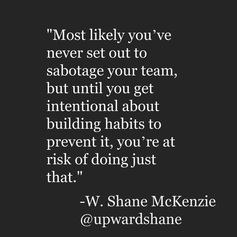 Growing up I had to share a bathroom with my mom. On the counter sat an oval vanity mirror. One side magnified my facial features and the other side reflected me the way I was used to seeing myself. The way I thought I should look. My mom used the magnifying side to be sure every detail of her air and makeup was in place. It gave a deeper impression than the standard side of the mirror. I looked in it from time to time and I found it revealed more of who I really was than the general impression I got from the other side. As an Executive Coach and Leadership Mentor, I’ve found there are also two sides to our leadership impact. Just like there were two sides to my Mom's mirror. First, there is the impact we believe our business behaviors have on those we lead or interact with on a daily basis. What's business behavior? It's how we communicate with our words, facial expressions, tone of voice, and body language as we are going about doing our daily work with others. It's how we set expectations for people who we need to help us get work done, and also our ability to follow through on commitments we make involving others. For the most part, we all have the intention of making a positive impact on those we lead. We want to do well for others and be our best for them. Because of our desires to lead well, we often form an opinion of how we must be perceived by others that matches our understanding of "good leadership". We create a general image of who we are based on who we aspire to be, and we like it. So, that's the narrative we use when answering the question, "how well am I leading?". Emphasizing our intentions alone can lead us to a dangerous place. A place where we see our "wish we were" image and not the impact our current actions are having on others. This is where what most refer to as blind-spots originate. Second, there is the reality of how our business behaviors actually affect those we lead and interact with on a daily basis. This is the magnified side of the mirror. It's here that our intentions meet the truth of what others experience as a result of our presence in their world. The ideal of course is that our intentions match up with the reality of how we behave in the business context. That's called integrity- integrating our intentions with our behaviors. You see, it’s the combination of both sides of the mirror that tells the truth. We need both our intentions and reality in order to grow. We can't determine how much integrity we have between our words and our actions if we are only listening to our interpretation of "the facts". We have to do the hard work and ask those closest to us in our business how we are actually affecting them. And that's hard. I know it’s hard because I’ve been on the receiving end of a 360 evaluation where the truth of how my actions were impacting the team was revealed. You can read about that here. It’s hard because a disconnection between our intentions and our actions creates problems in our leadership. If I tell you how much I value honesty as a leader and when you're honest with me I am consistently defensive in response, there is an issue! The less aware we are of our blind spots, the greater the chance we’re falling short of delivering on our intentions. No one likes to see disparity between their intentions and their actions. It often hurts. It makes us afraid. We run away from pain and we tend to fight what we fear. So, we never rotate the mirror to see the other side- we just gaze into the side that tells us what we hope is real. We decide it's safer to not know the truth. If you’ve already been made aware of your blind spots and you’re looking for help navigating through the process of changing you’re behaviors, I’m ready to come along side you. Register for your free strategy session here. A lack of intentional action, once you know you have to change to be a more effective leader, is the genesis for stunting your leadership growth. It's the birthplace of complacency and it will prevent you from pushing forward toward achieving more of what you truly want- to be the best version of you as a leader. It doesn't have to be this way. You can face the fear and subdue the anger that may come when you face the disparity between your intentions and reality. So, get with a trusted friend and tell them you want to rotate the mirror and see a deeper level of reality. Tell them you want to know how your business behavior is affecting those you work with on a daily basis and that you want to see the truth of how closely your behavior matches your intentions. Ask them to be a sounding board and a confidant as you walk through the process. Then, ask five people you work with on a daily basis these 3 questions:
W. Shane McKenzie is an executive coach who helps leaders achieve greater effectiveness and become more fulfilled in their work by facilitating positive changes in their leadership behaviors. Join the Leadership Transformation Roundtable to get your copy of the questionnaire I use to discover how close my intentions match the reality of those I lead. What others are saying about W. Shane McKenzie "I’ve worked with Shane for several years. He possesses a unique and highly effective combination of strategy, team leader and great communicator, a rare combination. He has a very strategic mind so he makes connections and sees disjointed paths where others do not. This allows him to both plot direction and execute the path to success. He’s truly committed to the greatness in others. He listens fully, asks the right questions at the right time, and gives us the space to both think and respond." - Linda Lindquist-Bishop, Strategic Facilitator, Speaker, Exit Planning for Business Owners, and World Champion Athlete “Shane is a trusted peer whose advice I seek when faced with leadership challenges. He brings clarity to tough situations and has been an objective sounding board for over 14 years!” – Pamela Westbrooks, Vice President of Administration
 “I’m the one who decides what we do around here”, are words I’ve never said. But, as leader, my actions have spoken them way to often! Our executive team meeting that day was like many I had attended. All the Vice Presidents were sharing weekly department updates. On this particular day, a direct report was in attendance with me to deliver an update on a corporate project that our division was in charge of completing. He did a great job! He was engaging and connected well with everyone. His presentation was clear and people saw how his plan could help us win as an organization. He was so good that our Executive VP let him know he was the perfect person to be leading the project and that he should run with the ideas he presented. Poised and polished would be two words I could have used to compliment him. But, I didn’t. Instead, once the meeting was over and we were walking back to our offices, I pulled him aside and said, “Hey, let’s make sure we are on the same page. Before you run with the ideas you presented in the meeting, I’d like you to run them buy me again, this time in greater detail. Before you act on them, let me take a look. Sound good?” This incident wasn’t the only time I behaved in a controlling way. It was a habit. Those days I believed that if you’re the person sitting at the head of the table or carrying the card with the higher title, it’s your job to tell other people what to do. I was afraid that if people were valuable on their own, without me, then that made my position vulnerable. I was also jealous. I wanted the praise. When a leader behaves the way I did that day, there are consequences. They’re not pretty. For me, my actions resulted in a member of my team doubting his abilities. He was super confused because I told him how confident I was in him while also indicating I wanted to see everything he was planning to do before he acted on it. I managed him into a fear of speaking up, stepping out, or crossing the line. My actions confused him to the point where he was no longer sure exactly what he was and was not responsible for in his role. Did anyone nominate me for executive of the year? Uh, no that’s a negative. As is always the case, I reaped exactly what I had sown. My bad habits produced a culture of doubt, criticism, cynicism, fear, and eventually jeopardized the morale and productivity of more than 30 people under my direction. I was a leader who had lost the confidence of my followers. Today, in my work as an executive coach, I come across leaders from time to time who believe they have to stay in control in order to be valuable. They talk about empowering their team but they act in a controlling manner. Like me on that day outside the boardroom, they are unaware of the negative impact their business behavior is having on their leadership influence. The get caught in the trap of believing their intentions to empower others overcomes their behavior to the contrary. It doesn’t work that way. It takes a secure leader to empower a team. As my experience testifies, an insecure leader can’t empower because there is too much at risk personally for the leader. The only option with this attitude is to control. No matter how nicely you do it, controlling is still controlling. Neither your personality nor your competence will ever make up for your faulty leadership behavior. As leaders, we are affecting people with our words and actions. We are influencing others. The question is for better or worse. Do people act on your directives because there job description says they have to or are they acting on them because they want to do it? When a person feels empowered at work they’re more likely to be producing from a “want-to mentality”. How much do you think my lack of leadership ability was costing our organization with a team of “have-to” followers, churning out redundant work and sitting in endless meetings needed to keep me in control of people? It was costly indeed! Thankfully, if you happen to find your story is eerily similar to mine, you too can change the ending. Just like me, you can face the reality of where you are failing to empower and make a decision to build new habits that will increase your influence on your team for the better. Most likely you’ve never set out to sabotage your team, but until you get intentional about building habits to prevent it, you’re at risk of doing just that. To make lasting changes in my behavior and create a more productive team environment, I focused on accountability and worked out of a few key principles. When you’re ready to start empowering instead of controlling others, here’s what you can do. How To Empower Others Instead Of Controlling Them
W. Shane McKenzie is an executive coach who helps leaders achieve greater effectiveness and become more fulfilled in their work by facilitating positive changes in their leadership behaviors. Want to learn more about working with Shane to transform your leadership? Visit ww.wshane.com What others are saying about W. Shane McKenzie “Shane is a trusted peer whose advice I seek when faced with leadership challenges. He brings clarity to tough situations and has been an objective sounding board for over 14 years!” – P. Westbrooks, Vice President of Administration |
AuthorW. Shane McKenzie is an Executive Coach and Mentor who specializes in helping successful leaders leave their job to own a business using proven strategies to minimize risk. Archives
May 2019
Categories
All
|



 RSS Feed
RSS Feed